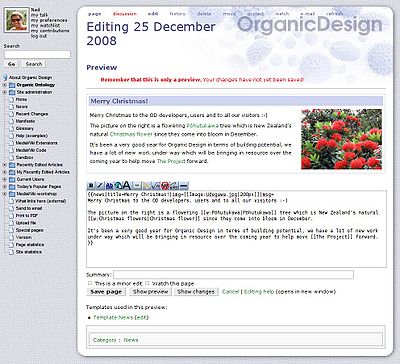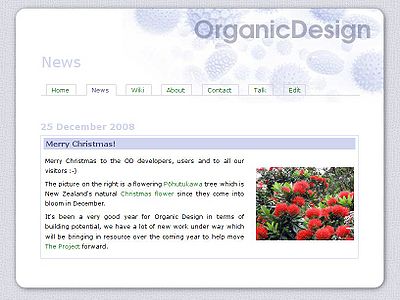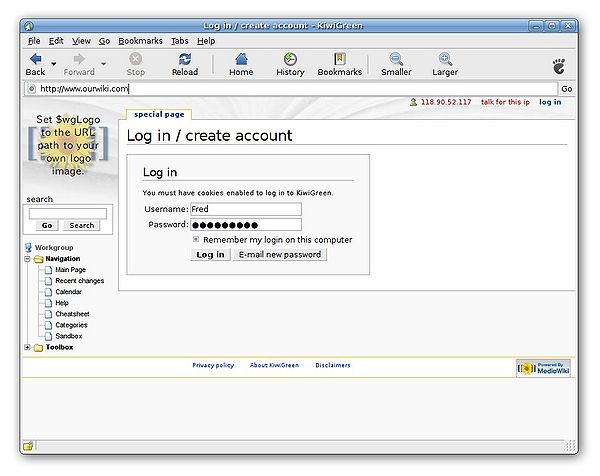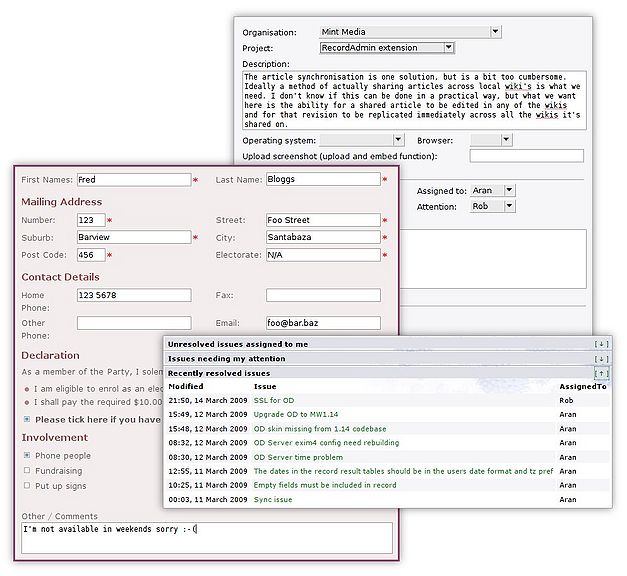Wiki Packages
Basic Wiki and Website
All our projects start off with a basic "out of the box" MediaWiki installation. These come pre-packaged with about twenty extensions that we've found to be very useful in practically all usage contexts, as well as a sidebar tree containing some helpful links for getting started with MediaWiki. It is a very quick process for us to set one of these on one of our servers up and we usually do it after an initial consultation with a prospective client but prior to the specification. We can also deliver a training session covering basic wiki usage and principles using the initially installed wiki as a separately charged item prior to the specification of the main project which allows users to begin populating their wiki with documents, ideas and other information which can contribute to the specification (that is assuming the organisation wants anything more than a basic wiki installation). Below is an example screenshot of such an installation.
Usually an organisation will want at the very least to have their wiki "skinned" to match their brand or existing web-site. In cases where the organisation already has an existing web-site, a decision needs to be made as to whether they will continue to use their existing means of managing their website content, or to move it over to the new wiki since it's an unnecessary complication to have two different content management systems in use at the same time. Having two systems in place usually involves duplicated information in different formats and complications involving either automatic or manual synchronisation between them.
Below is an example of a "skinned" wiki being used to manage website content. On the left we see a page called "25 December 2008" being edited in the wiki environment, where the address in the browser starts with wiki and requires authentication. On the right we see the same article viewed from the normal www address where it looks like a normal website with no wiki features present and is available to the public as usual. The content which is available to the public through the website address is restricted to only articles which are specifically designated as publicly available. This kind of set up is provided as a standard feature in our installations.
| wiki.organicdesign.co.nz/25_December_2008 | www.organicdesign.co.nz/25_December_2008 | |

|

|
The wiki "skinning" process usually costs about $500 if it's based on your existing design. If a design needs to be created as well, then that can vary greatly depending on complexity and how long it takes to reach something that all parties are happy with, but as a ball-park figure it usually costs around $2000. The process of migrating content from an existing website can also vary greatly depending on the size of the site and the technology it's using (for example if it has online ordering or other applicational features on it), but the average small business site has usually costed around $500 for content migration.
Wiki Organisation
Many organisations and projects are using wikis for more than just their content management needs. The wiki environment also works very well as a project management system due to it's inherent collaboration and auditing facilities. A basic wiki installation can be used for this by adopting working conventions that all of the wiki users in the organisation are familiar with and can refer to when necessary.
To be able to use a wiki in this capacity it is important that all the users take the advanced wiki training session which covers categorisation, article history, watch-lists, permissions and portals. With these skills the users can document their standard procedures and work on jobs together in accordance with a model called the blackboard metaphor. This is how the administrators collaborate on work together for the Wikipedia online encyclopedia project which the MediaWiki software was created for.
The Organic Design Package
The blackboard metaphor is a very good system for users who are scattered around the world in different time zones, speak different languages and work casually in their roles whenever they have time available. But for organisations working on an intranet together their needs are often more complex and dynamic, requiring tight schedules, records and reporting and a generally higher level of structure. This could still be done with a basic wiki installation and the blackboard metaphor, but would require extremely well defined practices and a very high level of skill from all the users.
At Organic Design we've been developing a "wiki organisation package" for the last few years which extends the basic wiki functionality to allow for an arbitrary level of complexity in terms of the organisational system that can be run in the wiki environment, while requiring the users to undergo only a few hours of additional training.
The wiki organisation package essentially offers the ability to have a custom made application created within the wiki environment which can even be modified by the users themselves after they've become familiar enough with it. This "collaborative application" aspect gives it a huge advantage over the standard desktop application paradigm, but on top of this, every change made to the application or any of the work being carried on within it is fully auditable and reversible since it's all part of the wiki's content which inherently comes with full history.
Even our basic installations come with all the wiki organisation extensions at no additional cost, but to have the structured content fully implemented for your organisation can take a lot of work to initially set up depending on the complexity of the aspects of your organisation you wish to model. The image below shows a few examples taken from wikis currently using the wiki organisation package.









